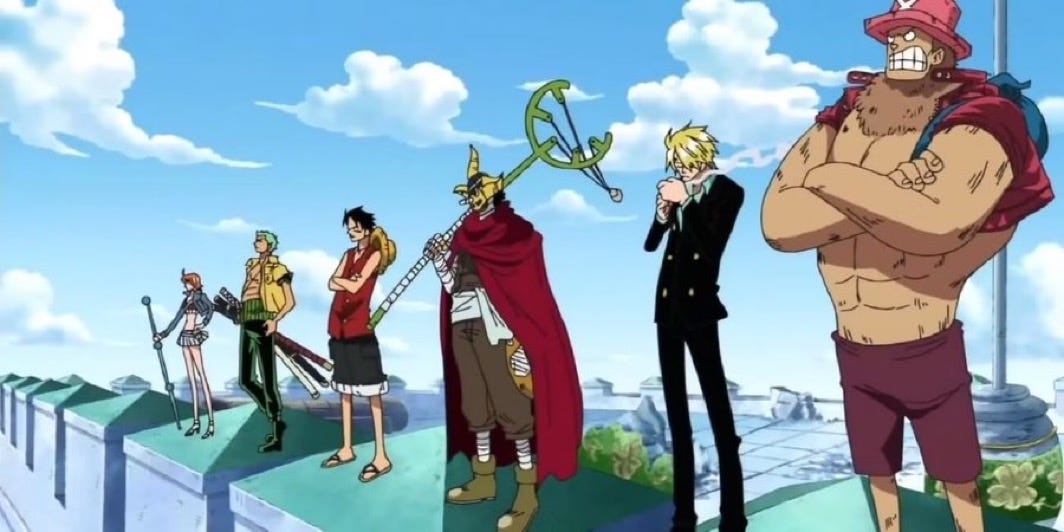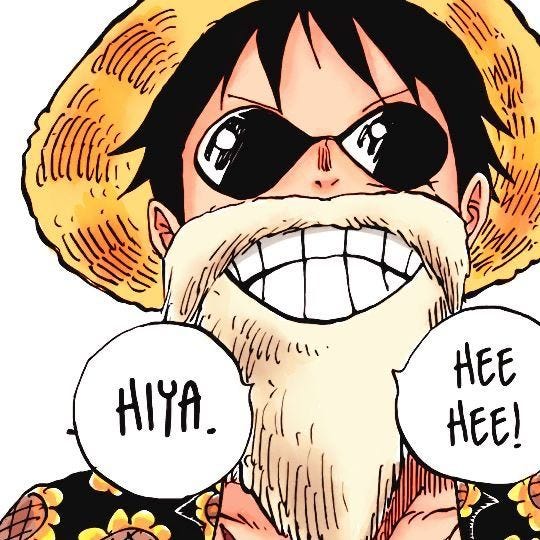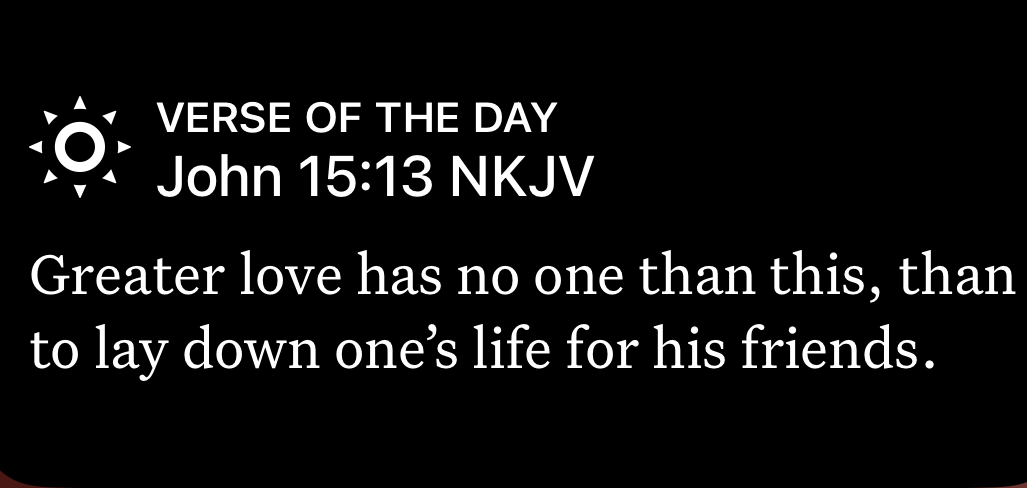The Power of Friendship: Luffy and a Liberatory Spiritual Pedagogy
I really wanted to make this letter into an Anime as Spirituality Podcast episode but my voice box is on vacation. Maybe in the future.
Today is Good Friday.
The day that Jesus died on the cross. In Christology, this is the most important day in the faith, if not the top three. He’s a pretty big deal.
It’s also the day that fulfilled this Scripture:
“No one has greater love than this, to lay down one’s life for one’s friends.”
John 15:13 NRSV
Love comes in myriad ways and duly has diverse expressions. Yet, the Great Ascended Master said that no other form of love tops self-sacrifice for one’s comrades, one’s friends. When I put my critical thinking brain on, it sounds like he's saying that friendships are the most sacred relationships a person can have.
Friends: People you can depend on. Those you want to protect.
So, of course, I think about Luffy.
In storytelling, especially in anime, self-sacrifice for the sake of friendship is a common and pervasive theme, to the point that “The Power of Friendship” is a storytelling trope that undergirds shonen and shojo anime alike. But no one—and I mean no animanga—does the power of friendship like Eiichiro Oda’s Monkey D. Luffy and the Straw Hat Pirates.
There is nothing Luffy won’t do for his friends’ lives or safety. He fights to the death for freedom. He’s willing to crash out for justice, and as a metaphor for liberation politics, Luffy sets a literary standard. Remaining committed to the collective struggle for liberation, he echoes the lengths Jesus said one should go for the love of their friends.
“Because love is an act of courage, not of fear, love is a commitment to others. No matter where the oppressed are found, the act of love is commitment to their cause--the cause of liberation.”
― Paulo Freire, Pedagogy of the Oppressed
Luffy comes close to death multiple times while defending his friends, and just as he reaches the edge of death, a miracle occurs1. His friends are his crew, of course, and his allies too, but what makes Luffy special is that he considers all those who are innocent and marginalized that he meets to be friends.
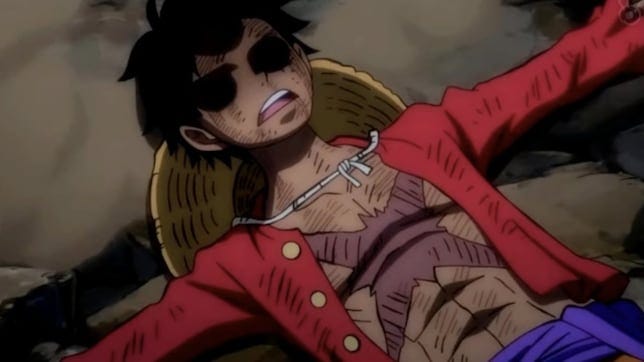
A primary tenet of somaesthetics in learning is “making friends2,” which involves dialogue through interpersonal relationships and effective communication. He has a sharp, intuitive sense of judgment about people’s character and knows who his enemies are. Luffy fights tooth and nail, shedding blood, sweat, and tears for his friends, and it makes me wonder what I am willing to risk for the safety and freedom of others. Because the point of his entire personality is to make friends with everyone who is most vulnerable, and to center the struggles of the marginalized and oppressed above all else.
But here’s a quick list of some sacrifices Monkey D. Luffy has made for his friends:
Fight against the Navy and Marines to free a man left to die on a crucifix—no big deal.
Openly declare war on the World Government by burning its flag3.
Liberated entire countries and kingdoms
Punch one god for exoticizing and enslaving his friend, and defeated another god for being wicked to his people.
Destroy a science lab illegally testing and drugging children.
Lead a prison break from the world’s most notorious underwater prison to set his brother free
End the exploitation and lives of evil dictators, enslavers, gangs, kings, politicians, human traffickers, abusers, and tyrants.
I could go on… on his pursuit of his dream to be the Pirate King, he kicks a lot of corrupt people in power’s asses. He can’t ascend to the throne unless he does. But the point is, Luffy, like Jesus, is a direct political opponent of evil and oppressive power. He stands on the principle of being a good friend and neighbor and fighting against what harms and exploits the least among us.
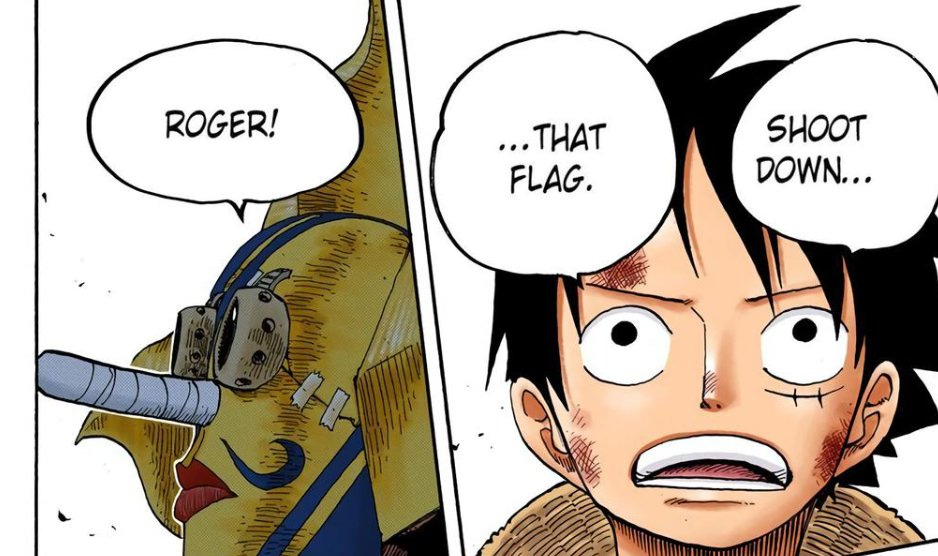
If One Piece took place in our world, Luffy would be Brazilian and speak Portuguese. So, I can’t help but think that his social justice stance is something Brazilian educator Paulo Freire would have enjoyed engaging with, due to the parallels with his Pedagogy of the Oppressed and his liberatory praxis, called conscientização.
Conscientização: Luffy & Liberation Theology and Politics
Black liberation theologies were born of enslavement and emphasize the needs of the marginalized and view salvation as liberation from White oppression4. There is a long history of Black theologians and clergy adding their voices to the cries for freedom that mobilized civil rights movements to the present. Notable among them are Harriett Tubman, Ella Baker, Mary Church Terrell, Dr. King, Dr. Howard Thurman, Malcolm X, and Dr. Howard-John Wesley.
Infused with liberation theology principles, Latino spirituality tends to be communal, as well as culturally and linguistically responsive. Liberation theology emerged in Latin America, aiming to promote social justice and fight poverty and inequality among Latinx peoples. Liberation theologians advocate for the poor and those who are oppressed5. Influenced by Liberation theology, Freire developed conscientización as a teaching method for poor adults in his community to learn about how directly their poverty was connected to systemic injustice by the Brazilian government. You can read and download his world-renowned Pedagogy of the Oppressed here.
Conscientização, or “conscientización, conscientization,” is a Portuguese term for critical reflection, coined by Paulo Freire (1973), an iconic and trailblazing figure in adult education, liberation politics, and community-centered social justice in Brazil. It is a critical consciousness process; therefore, critical thinking, as conscientização, teaches individuals to engage in a dialectical dialogue with their world, become aware of their circumstances, and initiate transformative actions. The women’s movement refers to this as consciousness-raising.
This empowering learning process enabled villagers to reshape their traditional perspectives by recognizing and critically analyzing their assumptions surrounding long-standing dependency relationships with those who govern their lives, typically the plantation and other large landowners (patrones, zamindars), exploitative merchants, employers, or political leaders. With these reflective insights, they could take collective action to bring about social change.
Luffy doesn’t fight for fame and glory; he fights for friendship and love. He’s liberating people not because he wants to be a hero, but because he’s relentless in fighting for people's freedom and inspiring them to fight for their own, too. A force of nature and the embodiment of the Warrior of Liberation.
“The more radical the person is, the more fully he or she enters into reality so that, knowing it better, he or she can transform it. This individual is not afraid to confront, to listen, to see the world unveiled. This person is not afraid to meet the people or to enter into a dialogue with them. This person does not consider himself or herself the proprietor of history or of all people, or the liberator of the oppressed; but he or she does commit himself or herself, within history, to fight at their side.” ― Paulo Freire, Pedagogy of the Oppressed
Similarly, the way Luffy makes friends and fights is very neurodivergently somesthetic—connected to his voice, body, and the communities he loves. He is emotionally loud, expressive, energetic, tactile, and kinetic with his love.
Sacrificing the body through active resistance is love.
More importantly, conscientização is a critical consciousness that encourages oppressed individuals to center our lived experiences and gauge our capacity for active resistance and resilience in the face of oppression, enough to critically ask:
What?
Why?
How?
For whom?
Against whom?
By whom?
In favor of whom?
In favor of what?
To what end?6
What is the benefit, the assurance, the guarantee of your friendship?
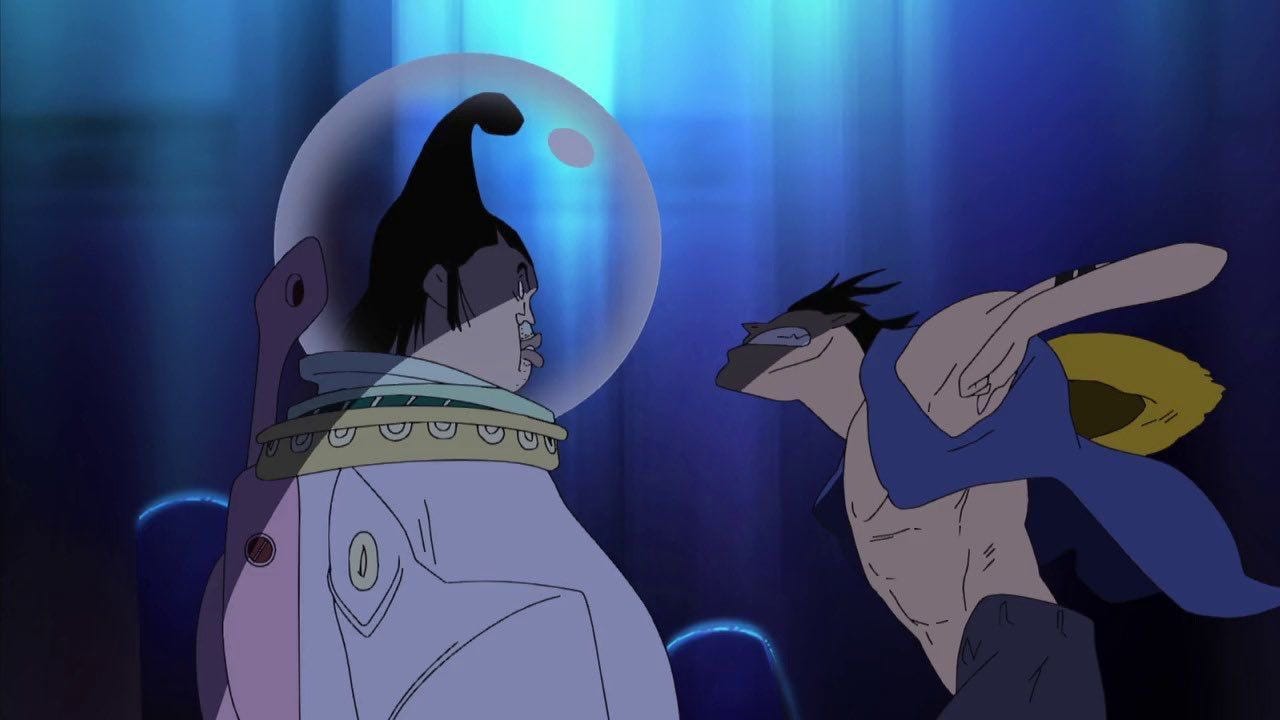
The Color of Friendship
These questions were answered on The Cross. Jesus chose to die for his friends. Call me selfish for wanting a friend like that, but that kind of loyalty is love to me. As a spiritual principle, being willing to suffer for another person is the highest form of love because it satisfies debts without enslaving the debtor. On a humanitarian level, it signals to your neighbor, “You are safe with me. You can trust me.”
I don’t have many friends. Not anymore because even the Twelve had a betrayer, a denier, and a doubter in their midst. I used to, though, and in those friendships, I did many things that I don’t regret to show my love. I’d never call myself the perfect friend, but I am a very good friend who desires the same loyalty in my friends. I am still creating space for friendships that are worthy of such radical sacrifices—friends who know how to suffer with me and are willing to make sacrifices for me. Where the exchange of love is a recurring action.7
“To exist, humanly, is to name the world, to change it. Once named, the world in its turn reappears to the namers as a problem and requires of them a new naming. Human beings are not built in silence, but in word, in work, in action-reflection.” ― Paulo Freire, Pedagogy of the Oppressed
A Colored Spirituality
And this self-sacrifice is literal, figurative, and subjective in myriad ways. Along these lines, a colored spirituality opens spaces for individuals who are oppressed at multiple levels. Black people answer these questions with our lives. We’ve lost so much and continue to sacrifice. Yet, we create even more by exploring the existential meaning of our lives while swimming in the sea of white supremacy and other socialisms and bigotries.
The sacrifice for friendship and allyship is just as important when the reason is this simple:
To protect you, I offer my life because I love you.
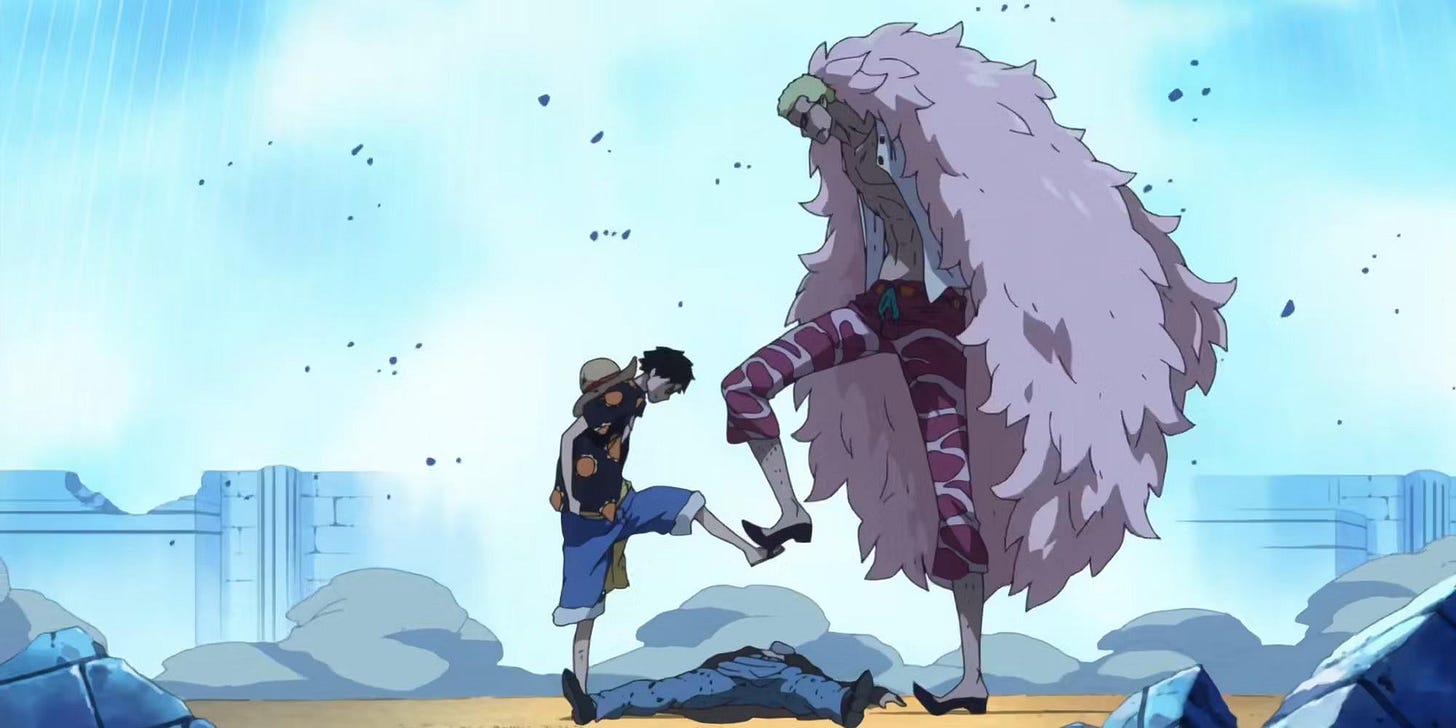
Women and queer people existing beyond the gender binary answer these questions through the interrogation of the constrictions of gender constructs, and dismantling toxic masculinity and the collectively oppressive spirit of Patriarchy, returning to a matriarchal social and spiritual order.
If you want to read more on that through another critical, Black neurodivergent lens, I suggest starting here with Lovette Jallow’s publication:
In essence, a colored spirituality focuses on social justice on an individual and interdependent level. It advocates for liberation and fosters solidarity among those who are oppressed. Indeed, the principle “liberate yourself by liberating others” embodies the essence of colored spirituality.
If you want to vicariously experience the unfathomable lengths, dangers, and valleys of the shadow of death that the power of friendship can take one through, watch One Piece, because there’s a resurrecting power embedded in the story in the end.
